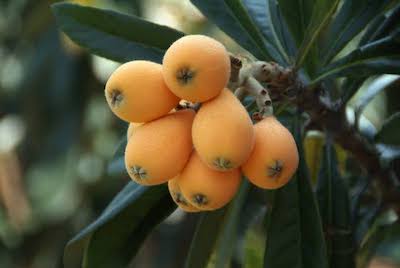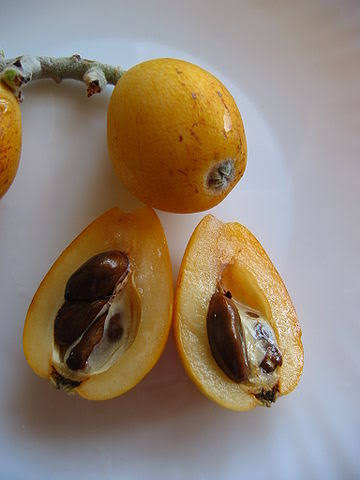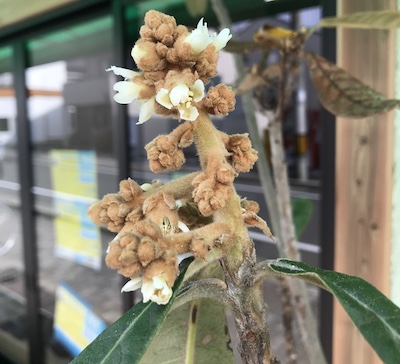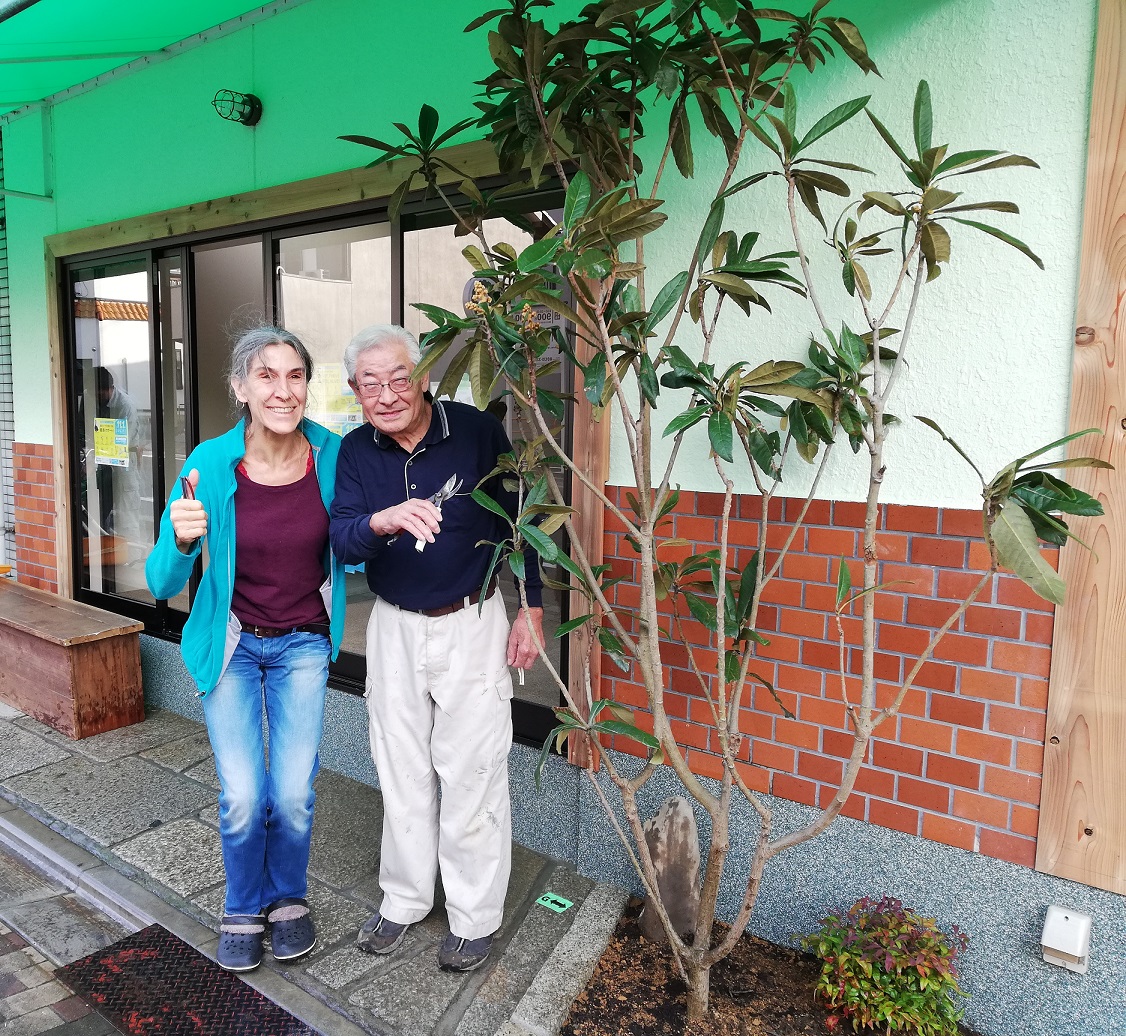Why We Chose the Biwa Tree
Hi this is Ela @ Crossfit Kyoto.

Why we chose the Biwa Tree?
Eat well, move more, feel better -> live & give your best
First and foremost, I wanted to have something alive outside the door of the box that would greet people on their way in and out with rich evergreen leaves, the sweet scent of flowers, and-- if possible, produce fruit we could share with everyone and therefore represent our slogan ‘Eat well, move more, feel better -> live and give your best’.
I wanted a native plant that
- is ornamental and at the same time would enrich our lives with its medicinal properties
- offers diversity, just like the CrossFit Kyoto culture and workouts (our program changes daily and our members and drop-in visitors come from far and wide, sharing much more than just their interest in physical fitness)
- gives tangible results, like bearing fruit that we can enjoy together, so it’s just like sharing the changes that result from joining CrossFit classes regularly
- clearly illustrates the cycle of life: seed, stem, flower, fruit, seed…
All in all, a tall order, BUT, believe it or not, with our humble little Biwa tree we were able to accomplish it all!
I was actually inspired by the Biwa tree in our garden that grew from my own seed. Every November it delights us with the lovely fragrance of its flowers and in June we get to enjoy the golden pear-shaped loquats that have grown slowly and steadily through the dark winter… It astounds me every year that the fruit would set during the coldest season, especially as winters seem so hard on my own body.
Just like CrossFit and its many fans

Whenever I share my Biwa fruit everyone really appreciates the deep flavour of something homegrown. It seems that not many people are aware of the preciousness of this rather humble tree, so I felt like introducing it at our new store front and I hope that dedicating a blog post to it will spark a renaissance/comeback. This way we can all appreciate and celebrate its many qualities once more.
The Loquat tree originated in China (the word “loquat” comes from Cantonese, where it is also known as the 'pipa' (批杷) in Mandarin, and Biwa in Japanese).
Established in Japan more than a 1000 years ago there are said to be over 800 varieties of Biwa around the world, spread far and wide, just like CrossFit and its many fans :D. It’s benefits (see below) can be enjoyed and are revered in: Korea, the hilly regions of India (Himachal) & Sri Lanka, the foothills of Pakistan, the Northern part of the Philippines, as well as in the middle east: Iran, Syria, Iraq, Jordan, Palestine, Israel and Lebanon; in southern Europe (the whole of the Mediterranean basin: Turkey, Cyprus, Greece, Malta, Italy, France, Spain, Portugal), and in Albania, Montenegro, Croatia, Slovenia, Georgia, Armenia, Azerbaijan; on the African continent: Morocco, Algeria, Kenya and in Mexico, Central & South America as well as in the warmer parts of the US; in Australia and New Zealand, Réunion, all the way to Tonga.
With the Biwa tree we have also found a buddy who shares in our endeavour to build a community and live a sustainable, holistic and healthy lifestyle. Come have a cup of tea with us and discover how it is all combined with our natural approach to healing!
It helps control cholesterol and glucose levels, and aids in digestion and weight loss
The leaves of the Biwa tree are not just tough, they have a warm, fuzzy side …(just like us, lol) and they produce a lovely aromatic tea. Biwa Cha - as it’s called in Japan - is known for its unique organic compounds regulating insulin and glucose levels, which protect us from diabetes and help reduce spikes & drops in blood sugar levels.
Biwa tea also soothes the respiratory system, boosts immunity, and thanks to its pectin content, aids in digestion and weight loss. It contains powerful antioxidants, and if consumed regularly can help control cholesterol levels and improve brain function.
Animal studies have shown that the fruit extract can suppress cell carcinogenesis at different stages such as cancer initiation, proliferation and metastasis. In a study conducted in Japan the polyphenols in loquat leaves showed cytotoxicity against human oral cancer.
Biwa flowers appear in autumn or early winter and exude a far ranging sweet aroma that can be experienced from quite a distance (like some of us after a sweaty training, lol).

Its golden oval fruit come in clusters, and after growing throughout the cold of winter and the wild weather of early spring they finally ripen sometime between late spring and early summer. This is why the biwa fruit isn’t just sweet-- it has that touch of sourness which reminds one of how life has both sides. When I bite into this juicy gem the soft texture of its skin reminds me of peaches, the aroma seems slightly citrusy, and it even brings a hint of the tropics with its mango-like flavour.
Reduces pressure on blood vessels and arteries therefore lowering blood pressure and promote heart health
The loquat fruit is especially high in Vitamin C and Iron (a combination that naturally help absorption). It offers Vitamin A, B-complex vitamins like thiamin, riboflavin, niacin, pyridoxine, foliates & folic acid, which boost our immune system and therefore our health, all contained in one little furry golden ball.
Besides iron, they are also an excellent source of many other minerals: calcium, manganese, potassium, phosphorus, zinc, copper and selenium. Thanks to its potassium content, the loquat is known to reduce pressure on blood vessels and arteries therefore lowering blood pressure and promote heart health. Potassium can improve brain function and cognition thanks to increased blood flow to the capillaries of the brain. Talking of helping our brains: the biwa fruit also contains monounsaturated fats like omega 3 & 6 fatty acids.
With its rich mixture of vitamins, nutrients and hormone-mimicking chemical components it has been shown to prevent bone density loss as well.
Health and prosperity
During my research for this blog post (after our biwa beauty had already been planted) I found out that in China the loquat is known to be a sign of prosperity and wealth, not just physically, but also spiritually, mentally, emotionally and communally. So if we hadn’t already been convinced about the perfect choice for everyone this certainly would have given us even more reason.
Thanks to our building owner, Mr. Yamamoto, who is a professional gardener, we not only have a wonderful stone framed bed for Biwa-chan, but we also were able to procure an elegant specimen which is already blooming, and spreading the lovely scent of its first open blossoms while I write this article.
We’re all looking forward to it settling into its new home and spreading its goodness alongside us.

At CrossFit Kyoto, we offer a "Wakaba" class.
It is ideal for people who don't feel confident about exercise,
are recovering from an injury, or for people who are 60+.
Our trial class is available any time. Please apply online via the button below.
ようこそクロスフィット京都ファミリーへ!
Welcome to the CrossFit Kyoto Family!
クロスフィット京都は京都駅から13分の北大路にあるスポーツジム
Crossfit Kyoto, training and sports gym, is located in Kitaoji and a mere 13 min subway ride from Kyoto station.
(Circuit training, personal training)






